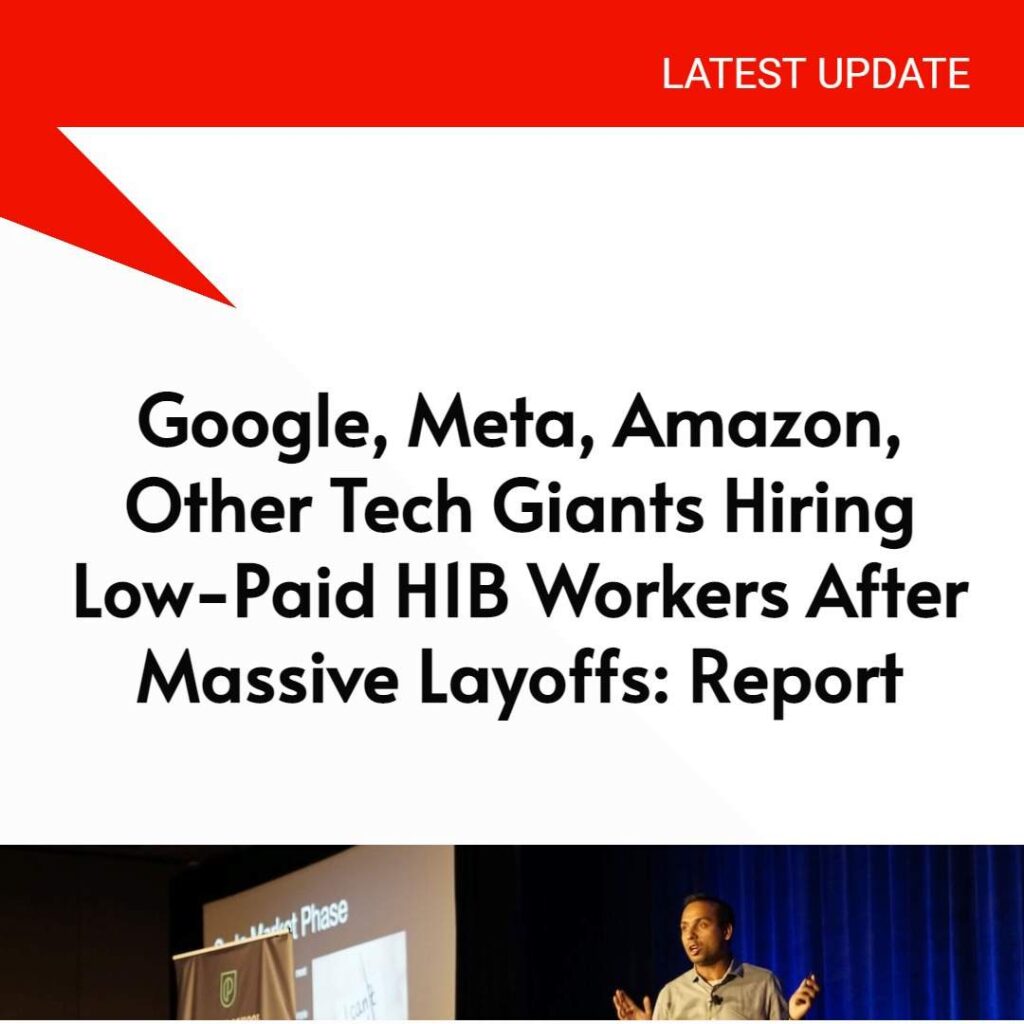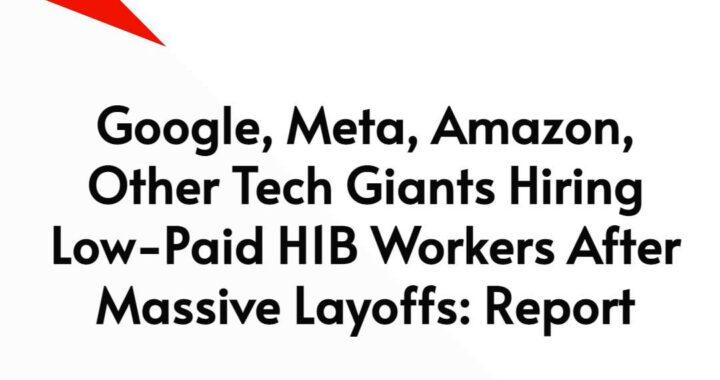Tech Titans’ Paradox: Google, Meta, Amazon, and More: Hiring Low-Paid H1B Workers Amidst Layoffs

Tech giants are in the news again, but this time it’s not for good reasons. According to a recent report, some of the biggest names in Silicon Valley are hiring cheaper foreign workers, despite having recently laid off thousands of employees. Google, Meta, Amazon, Microsoft, Zoom, Salesforce, and Palantir are among the companies who have applied for thousands of H1B worker visas this year. It’s ironic that many of the workers affected by the layoffs are on H1B visas themselves.
Even more surprising is that Google filed applications for H1B visas just a month after announcing plans to cut 12,000 jobs worldwide. The visas were for lower-paid roles such as software engineers and user experience researchers. Similarly, Meta reduced its workforce by nearly 25% in just a few months, despite CEO Mark Zuckerberg naming it the “year of efficiency.”
Amazon also announced more layoffs in March after cutting 18,000 jobs in January. Microsoft, meanwhile, announced it would cut 10,000 jobs to prepare for a potential economic downturn. It seems that despite these job cuts, these companies are still seeking to hire in key strategic areas. Take Control of Your Income: Apply for Online Jobs Today
The question is, why are these companies laying off workers and then hiring cheaper foreign workers? It’s a story that raises more questions than answers, and one that we’ll be following closely in the coming months.
As news of these hiring practices spread, workers on H1B visas, particularly those from India, found themselves caught in a whirlwind of uncertainty. Social media platforms became inundated with stories of individuals affected by the layoffs, sharing their experiences and seeking new job opportunities. The irony of their situation was not lost on them.
Amidst the backlash and growing public scrutiny, the tech giants attempted to defend their actions. They emphasized the need for cost-cutting measures and restructuring in response to market conditions. Amazon CEO Andy Jassy justified the additional layoffs as a necessary step for the company to streamline its operations, especially after a surge in online shopping during the pandemic. Unlock Your Earning Potential: Get Paid to Scroll with Facebook, Twitter, and YouTube!
While these companies stressed their commitment to hiring in strategic areas, critics argued that their pursuit of cheaper labor contradicted this narrative. Concerns were raised about the impact on the domestic workforce, as lower-paid foreign workers were perceived as potential replacements for higher-cost local employees. The debate surrounding the ethics and implications of these practices only intensified.
The revelations about Google’s H1B visa applications raised eyebrows among industry observers. Just a month after announcing significant job cuts, the tech giant appeared to be actively seeking new employees from abroad, particularly for technical roles. Similarly, Meta, the parent company of Facebook, also sought to reduce its workforce by a substantial margin, reflecting its “year of efficiency” approach. However, the filing of H1B applications for engineers at Alphabet-owned Waymo suggested a contradictory narrative.
Unlock Your Earning Potential: Get Paid to Scroll with Facebook, Twitter, and YouTube!
As the saga unfolded, Microsoft found itself in a delicate position. Despite announcing a global workforce reduction, CEO Satya Nadella reassured employees that the company would continue to hire in key strategic areas. While Microsoft aimed to strike a balance between cost-cutting measures and preserving its capacity for growth, critics questioned the timing and the implications of such decisions.
The news of these tech giants hiring low-paid H1B workers after massive layoffs had sent shockwaves through the industry. Many were left wondering about the long-term consequences and the potential repercussions for both the affected employees and the overall job market.
As the story continues to unfold, the eyes of the public remain fixed on these tech giants. The fate of those affected by the layoffs and the future direction of these companies will undoubtedly shape the ongoing discourse surrounding labor practices in the tech industry.
 Boost Your WhatsApp Community with These Fresh Chat Features
Boost Your WhatsApp Community with These Fresh Chat Features  Important Announcement! Google’s Account Deletion Policy May Affect You from December 2023!
Important Announcement! Google’s Account Deletion Policy May Affect You from December 2023!  Nike Released New Sneakers
Nike Released New Sneakers  Best Adidas Sneakers of 2019
Best Adidas Sneakers of 2019  सिखों के धार्मिक स्थान पर लगी आग
सिखों के धार्मिक स्थान पर लगी आग  Tech Titans’ Paradox: Google, Meta, Amazon, and More: Hiring Low-Paid H1B Workers Amidst Layoffs
Tech Titans’ Paradox: Google, Meta, Amazon, and More: Hiring Low-Paid H1B Workers Amidst Layoffs